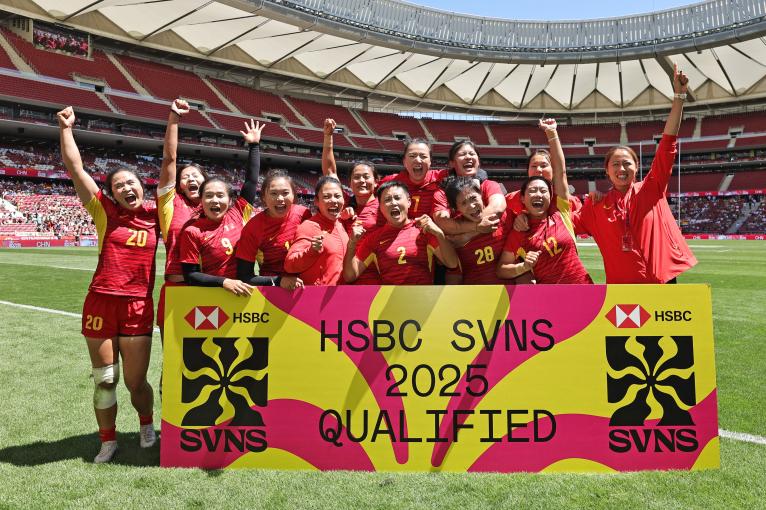L'Australie remporte le tournoi de Madrid

L’Australie a remporté la Grande Finale féminine du HSBC SVNS grâce à un triplé de Maddison Levi qui a permis à son équipe de battre la France 26-7 et de remporter sa première victoire depuis Le Cap.
L’Australie, qui a fait partie des favoris du SVNS pendant presque toute la saison avant de s’incliner face à la Nouvelle-Zélande à Singapour, a été la meilleure équipe tout au long du week-end à Madrid, éliminant la Nouvelle-Zélande au terme d’une demi-finale à rebondissements.
Les Blacks Ferns Sevens ont ensuite battu le Canada pour la médaille de bronze.
Dans les play-offs, la Chine remplacera l’Afrique du Sud dans les SVNS Series la saison prochaine. Les nouvelles venues ont battu la Belgique 33-0 dans leur finale de qualification, tandis que l’Afrique du Sud s’est inclinée 22-0 face à l’Espagne.
Finale
Australie 26 – 7 France
Le match a débuté avec une grande intensité, les deux équipes montrant une défense agressive et une certaine tension, notamment avec Maddison Levi de l’Australie qui a chambré les Françaises. Les Australiennes ont pris les devants grâce à un essai de Faith Nathan après qu’Anne-Cécile Ciofani se soit blessée, laissant les Bleues défendre à six. Les Françaises ont répondu rapidement avec un essai de Yolaine Yengo, égalisant ainsi le score à 7-7. À la mi-temps, les Françaises étaient bien en place et pouvaient espérer une issue favorable.
Cependant, la deuxième période a été marquée par la performance exceptionnelle de Maddison Levi, qui, bien surveillée en première période, a pris le dessus dans les cinq dernières minutes du match. Elle a d’abord redonné l’avantage à son équipe en cassant les plaquages sur une course croisée avec Charlotte Caslick, puis a marqué un deuxième essai en bout de ligne, suivi d’un troisième essai dans les arrêts de jeu, portant le score final à 26-7 en faveur de l’Australie. Levi a ainsi scellé la victoire des siennes avec son 69e essai de la saison.
Demi-finales
Australie 21 – 19 Nouvelle-Zélande
Une première période haletante a vu les deux équipes passer par les phases offensives, mais la Nouvelle-Zélande a été la première à frapper par l’intermédiaire de Mahina Paul. Tia Hinds a utilisé sa vitesse pour réduire le score pour l’Australie, mais elle est menée 7-5 à la pause.
La Nouvelle-Zélande prenait encore plus d’avance en seconde période, Jorja Miller arrachant le ballon des mains australiennes pour servir Risi Pouri-Lane, avant que Portia Woodman-Wickliffe n’utilise toute sa puissance pour transpercer Charlotte Caslick et donner à son équipe une avance de 19-7.
A moins d’une minute de la fin, l’Australie a finalement riposté avec un essai brillamment travaillé, terminé par Faith Nathan dans le couloir gauche, pour leur donner une chance de s’imposer. Maddison Levi s’étirait de toute sa hauteur pour gagner le coup d’envoi suivant pour l’Australie, et un autre mouvement patiemment travaillé trouvait Caslick sur la gauche, qui s’échappait avant de trouver Levi pour finir.
Tia Hinds, qui avait botté ses deux transformations précédentes, s’avançait avec le score en ligne de mire et envoyait un coup de pied sans ménagement au milieu des poteaux pour achever ce fameux come-back.
Canada 17 – 19 France
Les Françaises ont dominé la rencontre contre le Canada sans jamais creuser un écart décisif, avec Yolaine Yengo se montrant plus efficace que les buteuses nord-américaines. Dès la première minute, Séraphine Okemba a ouvert le score, mais les Canadiennes ont répliqué rapidement par Florence Symonds. Okemba a de nouveau marqué avant qu’un contre de Yolaine Yengo juste avant la pause ne porte le score à 19-5. Avec cet avantage de deux essais transformés, les Bleues semblaient en bonne position pour la deuxième période.
Cependant, le Canada a profité des erreurs françaises pour revenir au score avec des essais de Kawara Wardley et Asia Hogan-Rochester, réduisant l’écart à 19-17 alors que Valentine Lothoz écopait d’un carton jaune. Malgré des dernières secondes tendues, la défense française a tenu bon, assurant leur place en finale contre l’Australie, qui a battu la Nouvelle-Zélande 21-19. Cette finale offrira aux Bleues l’occasion de prendre leur revanche après avoir été défaites par l’Australie 28-14 lors de la phase de poule.
Finale de bronze
Dans une répétition de l’étonnante victoire canadienne de la veille, Charity Williams a marqué le match de son empreinte en faisant preuve d’une rapidité typique pour ouvrir le score sous les perches, mais Mahina Paul n’a pas tardé à remonter au score. Theresa Setefano ajoutait un deuxième essai pour un score de 12-7 à la pause.
En seconde période, le match est resté serré jusqu’aux dernières minutes, mais un essai de Jorja Miller a permis à la Nouvelle-Zélande de prendre de l’avance et de s’assurer la médaille de bronze grâce à sa victoire 26-14.
Barrage HSBC SVNS
La Chine, invaincue tout au long du week-end à Madrid, a assuré sa place sur le HSBC SVNS Series de la saison prochaine de manière éclatante, en battant la Belgique 33-0, ce qui lui a permis d’accéder au circuit mondial.

L’Afrique du Sud a perdu son statut de nation titulaire en s’inclinant 22-0 dans match à élimination directe contre l’Espagne. Les Espagnoles ont pris une avance de 10-0 à la pause et ont tenu l’Afrique du Sud en échec pendant tout le match, ajoutant deux autres essais en deuxième mi-temps.
Le Japon, qui affrontait l’Argentine, a réussi à conserver sa place dans les Series en s’imposant 26 à 12, tout comme le Brésil, qui a battu la Pologne 38 à 7.

